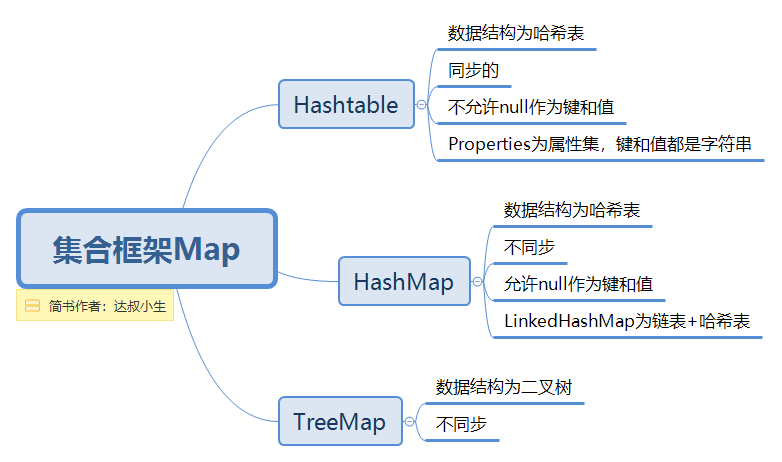
Brief Book Author: Dashu Xiaosheng
Collection Framework Map in Java
01
Map provides three collection views:
- Key set
- Value set
- Key-Value Mapping Set
public String getWeek(int num){ if(num<0 || num>7){ throw new NoWeekException(num+"No corresponding week"); String[] weeks = {"","Monday"...."Sunday"}; return weeks[num]; } }
Sunday (Sunday), Monday (Monday), Tuesday (Tuesday), Wednesday (Wednesday), Thursday (Thursday), Friday (Friday), Saturday (Saturday)
java.util Interface Map<K,V> Parameters: K is the key for this mapping The value of V for this mapping
Knowing subinterfaces:
Bindings,ConcurrentMap<K,V>,ConcurrentNavigableMap<K,V>,LogicalMessageContext,MessageContext,NavigableMap<K,V>,SOAPMessageContext,SorteMap<K,V>
Knowing the implementation class:
AbstractMap,Attributes,AuthProvider,ConcurrentHashMap,ConcurrentSkipListMap,EnumMap,HashMap,Hashtable,IdentityHashMap,LinkedHashMap,PrinterStateReasons,Properties,Provider,RenderingHints,SimpleBindings,TabularDataSupport,TreeMap,UIDefaults,WeakHashMap
Implemented interfaces:
public interface Map<K,V>
There can be no duplicate keys in the mapping, and each key can only be mapped on one value.
Characteristics in Map Sets:
- Internal storage mode is in the form of key-value pairs
- Keys in Map s should be unique
Nested classes (internal):
| Method | Explain |
|---|---|
| Map.Entry<K,V> | Static interface, static interface, mapping schema key-value pairs |
Map method:
| Method | Explain |
|---|---|
| clear() | The type is void, and all mapping relationships are removed from the mapping |
| containsKey(Object key) | Returns the boolean type. If the mapping contains the specified key, it returns true and vice versa. |
| containsValue(Object value) | Returns the boolean type, if one or more keys in the mapping are mapped to the specified value, returning true and vice versa |
| entrySet() | The return type is Set < Map. Entry < K, V > Returns the mapping relationship contained in this mapping. |
| equals(Object o) | The return type is boolean, comparing whether the specified object is equal to the mapping |
| get(Object key) | Returns the value mapped by the specified key. If the mapping does not contain the mapping relationship of the key, it returns to null, which means no |
| hasCode() | Returns an Int type, returning the hash code value of this mapping |
| isEmpty() | The return type is boolean. If the mapping has no key-value mapping, it returns true and vice versa. |
| keySet() | The return type is Set<E>, returning the Set view of all keys contained in this mapping |
| put(K key, V value) | The method of establishing mapping relation and adding mapping relation to corresponding key and value |
| putAll(Map<? extends K, ? extends V> m) | The return type is void, and all mapping relationships are copied from the specified mapping relationship to the mapping |
| remove(Object key) | If there is a mapping relationship for this key, remove it |
| size() | The return type is Int, returning the number of key-value mappings in this mapping relationship |
| values() | The return type is Collection < V>, returning the Collection view of the values contained in this mapping |
put
V put (E key, V value)
The corresponding key and value are mapped, and the method of adding the mapping relationship is established. If the mapping relationship existed before, the specified value will be replaced by the old value.
Parameters:
Key - The key for the specified Association
Value - The value of the specified Association
Errors that will be thrown:
Unsupported OperationException: put operation is not supported ClassCastException: Mapping relationships are not allowed NullPointerException: The specified key or value is null, and this mapping is not allowed to store Illegal ArgumentException: The specified key or value is not allowed to be stored in the map
General implementation classes:
HashMap
java.util //Class HashMap < K, V > java.lang.Object -> java.util.AbstractMap<K,V> -> java.util.HashMap<K,V>
Parameters:
K-is the corresponding key V-is the corresponding value
Implemented interfaces:
Serializable,Cloneable,Map<K,V>
Known subclasses:
LinkedHashMap,PrinterStateReasons
So:
public class HashMap<K,V> extends AbstractMap<K,V> implements Map<K,V>, Cloneable, Serializable
02
Map example:
import java.util.HashMap; public class MapDemo { public static void main(String[] args){ // Building map Map<String,String> map = new HashMap<String,String>(); // Additive elements map.put("Monday", "Monday"); mpa.put( ...// Add it on your own. map.put("Sunday", "Sunday"); // When adding an element, if the key is the same, the value overrides map.put("Sunday", "SundayDemo"); // The value is covered. // Get value String value = map.get("Sunday"); // The key exists, the return value is null, and vice versa. // Delete elements String s = map.remove("Sunday"); // Delete the corresponding key-value pairs so that they are missing in the Map set } }
How to get all the keys
Map<String,String> map = new HashMap<String,String>(); map.put("Monday", "Monday"); map.put("Sunday", "Sunday");
Using keySet
Set<String> keySet = map.keySet(); for(Iterator<String> it = keySet.iterator(); it.hasNext(); ){ String key = it.next(); String value = map.get(key); System.out.println(key + " : " + value); }
You can use the foreach loop
for(String key : keySet){ System.out.println(key + " = " + map.get(key)); }
entrySet
Set<Map.Entry<K,V>> entrySet()
To return the view of the mapping relation Set contained in this mapping, the mapping relation in the map set is stored in the set set.
Mapping relationship: the relationship between keys and values, the type of data type Map.Entry (internal) relationship
Set<Map.Entry<String,String>> entrySet = map.entrySet(); Iterator< Map.Entry<String,String> > it = entrySet.iterator(); while(it.hasNext(K,V)){ Map.Entry<String,String> m = it.next(); // Get key String key = m.getKey(); // Get value String value = m.getValue(); System.out.println(key + " : " + value); }
Map.Entry<K,V>
java.util //Interface Map.Entry<K,V>
Interface implementation class:
AbstractMap.SimpleEntry , AbstractMap.SimpleImmutableEntry
Interface:
public static interface Map.Entry<K,V> // For mapping item-key-value pairs
Map.Entry<K,V>Method
Method:
| Method | Explain |
|---|---|
| equals(Object o) | The return type is boolean, comparing the equality of the specified object with this item |
| getKey() | Returns the key corresponding to this item |
| getValue() | Returns the corresponding value for this item |
| hashCode() | Return type int, return hash code value for this item |
| setValue(V value) | Replace the corresponding value with the specified value |
for(Map.Entry<String,String> m : map.entrySet()){ String key = m.getKey(); String value = m.getValue(); System.out.println(key + " : " + value); }
interface Map{ public static interface Entry(); }
values()
The return type is Collection < V>, returning the Collection view of the values contained in this mapping
Collection<String> values = map.values(); for(String value : values){ System.out.println("value:"+value); }
Summary: Map - > entrySet () getKey () getValue () - > keySet () get (key) - > values ()
03

Hashmap
public class HashMapDemo { public static void main(String[] args){ Map<Student,String> map = new HashMap<Student,String>(); // Additive elements map.put(new Student("da",12), "1"); map.put(new Student("shu",13), "2"); map.put(new Student("dashu",14), "3"); // Remove data // Set<Student> keySet = map.keySet(); // for(Student key : keySet){} for(Student key : map.keySet() ){ String value = map.get(key); System.out.println(key.toString() + " : " + value); } } }
public class Student implements Comparable<Student>{ private String name; private int age; public Student(){ super(); } public Student(String name, int age){ super(); this.name = name; this.age = age; } public String getName() { return name; } public void setName(String name) { this.name = name; } public int getAge() { return age; } public void setAge(int age){ this.age = age; } @Override public String toString() { return "Student [name = " + name +",age = " + age + "]"; } @Override public int hasCode() { final int prime = 31; int result = 1; result = prime + result + age; result = prime + result + ((name == null) ? 0 : name.hashCode()); return result; } @Override public boolean equals(Object obj){ if(this == obj) return true; if(obj == null) return false; if(getClass() != obj.getClass() ) return false; Student other = (Student) obj; if(age != other.age) return false; if(name == null){ if(other.name != null) return false; }else if(!name.equals(other.name)) return false; return true; } @Override public int compareTo(Student o){ int temp = this.age - o.age; return temp == 0? this.name.compareTo(o.name) : temp; } }
TreeMap
public class TreeMapDemo{ public static void main(String[] args){ Map<Student, String> map = new TreeMap<Student, String>(new ComparatorByName()); // Additive elements map.put(new Student("da",12), "1"); map.put(new Student("shu",13), "2"); map.put(new Student("dashu",14), "3"); // Remove data for(Map.Entry<String,String> m : map.entrySet()){ Student key = m.getKey(); String value = m.getValue(); System.out.println(key + " : " + value); } } }
public class ComparatorByName implements Comparator<Student>{ @Override public int compare(Student o1, Student o2){ int temp = o1.getName().compareTo(o2.getName()); return temp == 0 ? o1.getAge() - o2.getAge() : temp; } }
04
Example:
public class CollectionsDemo { public static void main(String[] args) { Map m = new HashMap(); m.put("da", "8"); m.put("shu", "9"); m.put("dashu", "10"); m.put("dashucoding", "12"); System.out.println(m); } }
Java Map Collection Class
The most commonly used collection classes are List and Map. The implementation classes of List include ArrayList and Vector. List can be changed in size, suitable for building, storing, and manipulating lists of any type of object elements.
Map is more general. Map collection classes are used to store element pairs. They are key-value pairs. Each key maps to a value. Understandably, List can be regarded as Map of numeric keys, but they have nothing to do with each other.
All key-value pairs - entrySet()
All keys - keySet()
Value - values()
Iterator keyValues = map.entrySet().iterator(); Iterator keys = map.keySet().iterator(); Iterator values = map.values().iterator();
entrySet(): Returns the Set view of the mapping contained in the Map.
keySet(): Returns the Set view of the key contained in the Map.
values(): Returns the Collection view of the values contained in the Map.
For the rest of my life, you are the only one.
Brief Book Author: Dashu Xiaosheng
Post90s handsome young man, good development habits; ability to think independently; initiative and good communication
Brief Book Blog: https://www.jianshu.com/u/c785ece603d1
epilogue
- Next, I will continue to explain other knowledge in depth. I am interested in continuing to pay attention to it.
- A little gift or a little compliment